|
Cycle 6 (2017 Deadline)
Wild and edible insects to sustain forests and fight malnutrition
PI: Andrianjaka Ravelomanana, ravelomanana.njaka@gmail.com, Madagascar Biodiversity Center (MBC), Antananarivo, Madagascar
U.S. Partner: Brian Fisher, California Academy of Sciences
Project dates: December 2017 - August 2021
June 2021 USAID Blog Post in Medium
Project Overview:
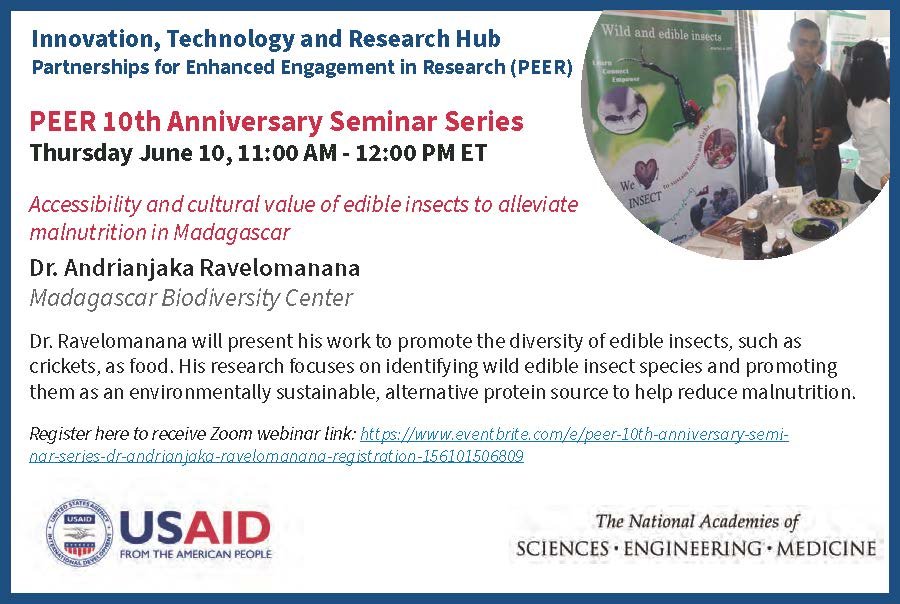 | 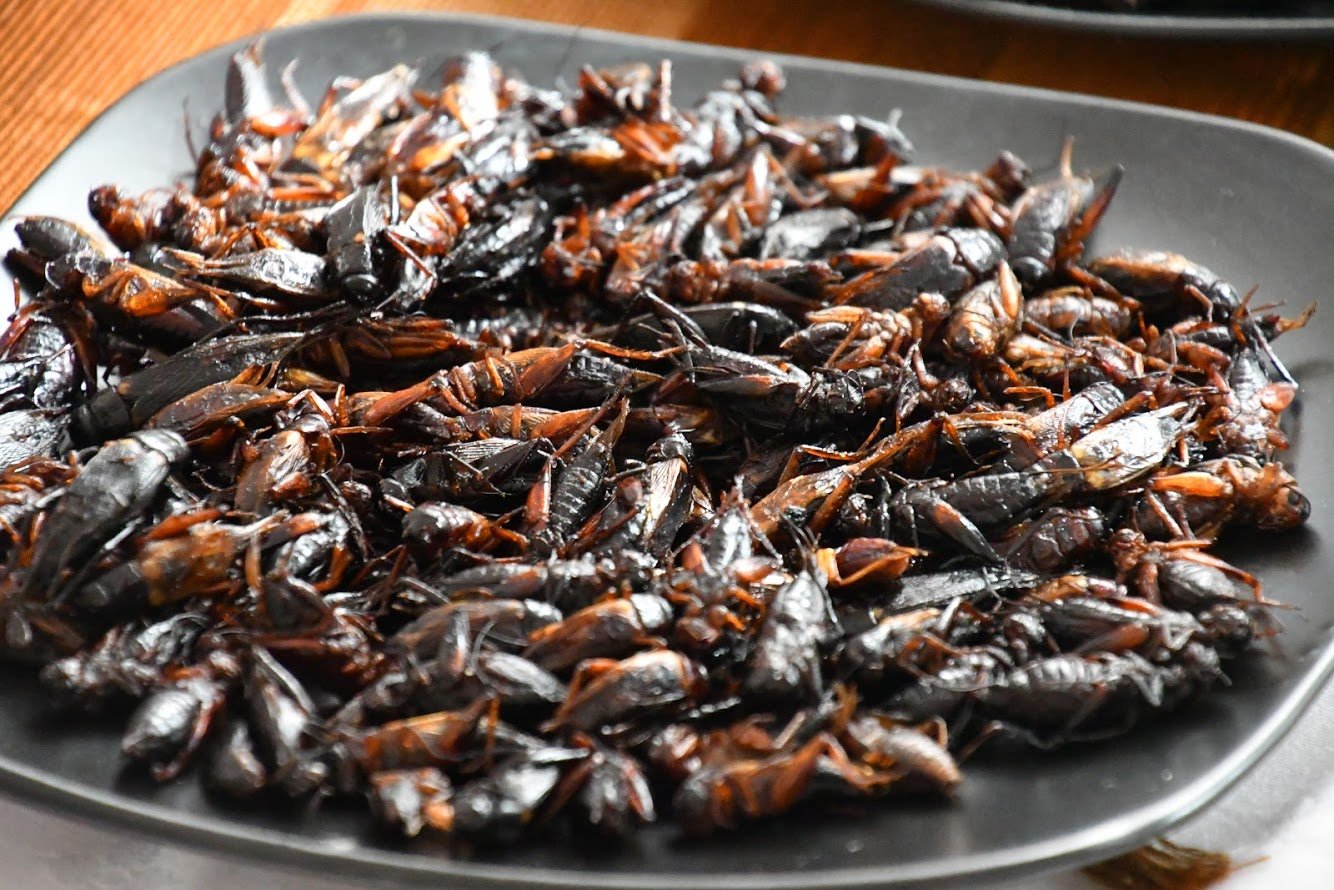 | | Seasoned edible crickets at MBC, Antananarivo. Photo credit: NAS |
Insects farmed for food can provide an environmentally sustainable and nutritious alternative to traditional protein sources. Insects offer a far greater range of nutrients than commonly consumed meats yet require a much smaller footprint to produce. In Madagascar, insects are an indispensable part of seasonal diets for many ethnic groups. This research team aims to strengthen the tradition of eating insects with innovative techniques to make this valuable food resource available in all seasons while encouraging forest conservation. Their method will link the benefits of insect farming with a healthy, natural forest habitat. They intend to improve the diets of malnourished children by promoting a farming system that increases the value of the forest in the eyes of local people. The project will first evaluate suitable insect species for commercialization and create a knowledge bank of edible insects of Madagascar. One species will be chosen for protein powder production and another for whole insect consumption. The researchers will conduct experiments to determine optimal conditions for commercial-scale farming, including an evaluation of biological cycles, nutrient content, and other technical variables that affect farming costs and conservation impacts. They will also evaluate local attitudes towards insect consumption to ensure the program is suitable for local markets. The research will be conducted in collaboration with local NGOs, the private sector, and a team of international mentors.
Insect farming can produce a high nutrient protein source with a reduced footprint. Its low-resource demands can relieve pressures on the environment and provide food security. Insect farming can help Madagascar address development issues such as population growth, food security, habitat fragmentation, diminishing water resources, child nutrition, and persistent poverty. For a modest investment, the researchers expect large returns that will advance both development and conservation goals. Their research will be directly applied to the production of whole insects for local consumption and protein powder for commercial sale. In local communities, they aim to empower marginalized groups such as women and the rural poor to produce their own food, thus contributing to regional food security. Farming of whole insects for local consumption will also include the planting of native host trees as part of a reforestation program. In addition, they plan to develop leadership in Madagascar for insect farming research. Findings will be shared freely with the private sector with the aim of promoting a cottage industry of insect farming in Madagascar that will benefit business, the people, and the forest.
Final Summary of Project Activities and Results
Insects farmed for food can provide an environmentally sustainable and nutritious alternative to traditional protein sources. Insect farming releases much less greenhouse gas, methane, and ammonia than raising cattle and pigs, and requires less water, less space, and less time. Those aspects alone are enough to promote insects for human consumption and to start changing dietary behaviors. Improving the long-standing Malagasy cultural attitudes towards edible insects and promoting their consumption were the main goal of the project.
The first two years were focused on gathering knowledge on edible insects and the development of their farming techniques. For the Malagasy people, eating insects is part of their diet but their popularity depends on the region, seasonality, and ethnic groups. Merina and Betsileo are the main ethnic groups in the country with insects being part of their diet. Two graduate students conducted research on this and part of their commitment remains to publish at least two articles in a scientific journal. Overall, the project team's findings highlight that human activities with special concern to deforestation associated with climate change are the main factors to the decline of the insect population. This is the case for major edible insect species largely consumed such as sakondry (Zanna tenebrosa) and the wild silkworm (Borocera cajani). In late December 2020 the Wildlife Conservation Society in the National Park Makira gave the project team an opportunity to create a few pilot farms.. This is one of the team's current activities allowing the project to maximize links to conservation and increasing the perceived value of forests. The team's research in this forest led to understand that the availability and habitat destruction were the main cause of the entomophagy decrease.. An important step was also taken in terms of promotion of the project.. The team engaged in different dissemination activities including attending national events to promote new tools to fight malnutrition. The project team recommend to use the cricket powder and integrate its use n the national policy.
The tea, produced 573 kg of cricket powder in 2020, with the same amount produced within seven months the following year. According to the PI, local market promises new opportunities and enhances the value of the project team's product due to the ongoing food security issues in the south of Madagascar. The main buyer of the cricket powder - Catholic Relief Services - has maintained its continuous procurement of cricket powder for schools and new investment companies are stepping forward showing their interest in the product..
- In terms of cricket nutrient research, convincing the consumers to embrace insect consumption is often focused on reporting benefits of its nutrient levels, and lower land use requirements during their production. It was important to highlight the epistemological aspect of consumer acceptance of crickets as food. This step allowed the team to promote their product more effectively.
- In terms of cricket powder production, the technique for large-scale production of native crickets in the course of the project has been refined and is now well developed. The team can now share the principles of farming and will create a pilot farm in the south of Madagascar where the need is the highest.
- The project team received positive feedback from their partners, Paradise Garden, regarding the efficiency of their bio-fertilizer produced from cricket frass. The team produced 1.7 tons of frass and half of this will be shared with the local farmers. The remaining bio-fertilizer will be used for reforestation in Manombo Forest, in the East of Madagascar.
During 2020, the project team sold 85 kg to CRS for supplementing food in schools in the North and to the Tuberculosis hospital in the South of Madagascar, while in 2021, the production grew to 100 kg.
For more information on how the idea of the project was conceived, see the article by Andy Isaacson entitled Farming Insects to Save Lemurs.
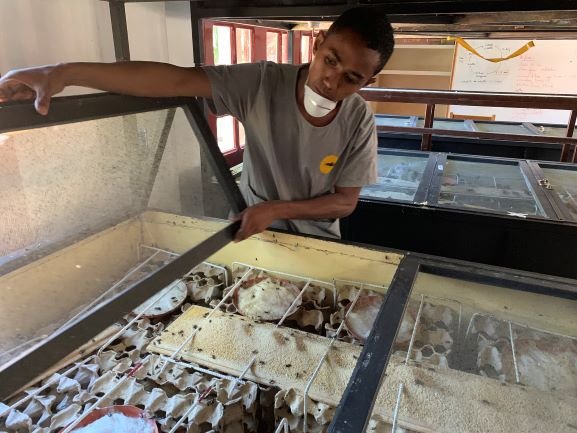 | 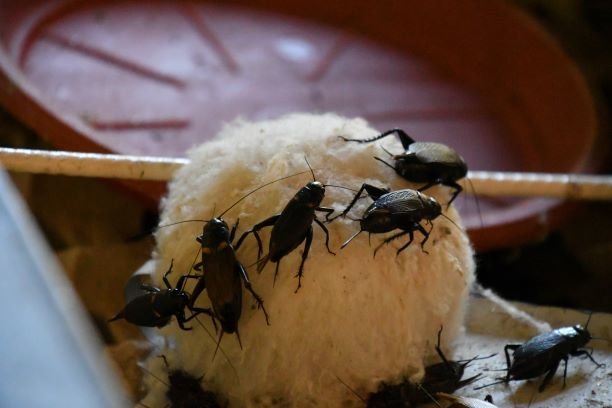 | | | Students demonstrate cricket farming process at MBC. Photo credit: Lina Stankute-Alexander (NAS) | | |
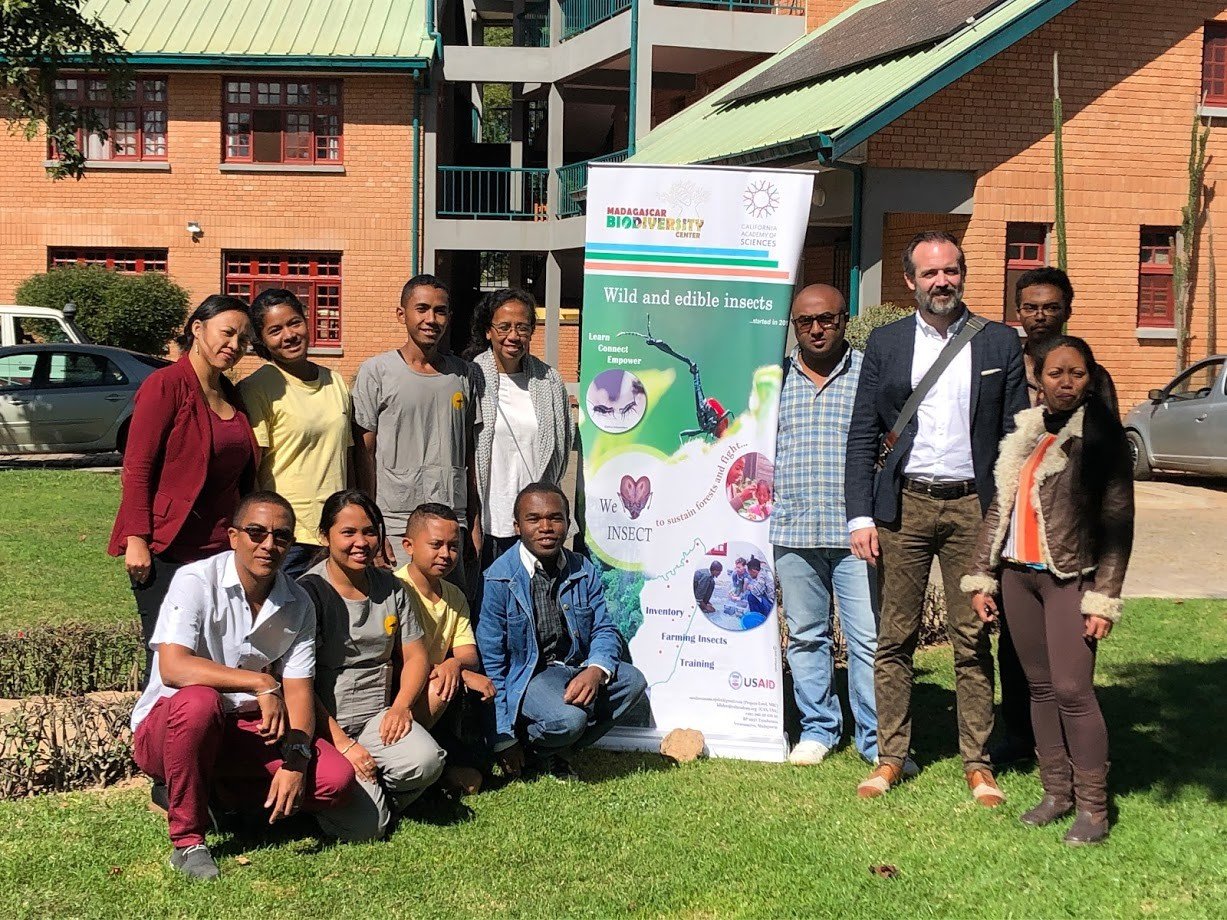 | 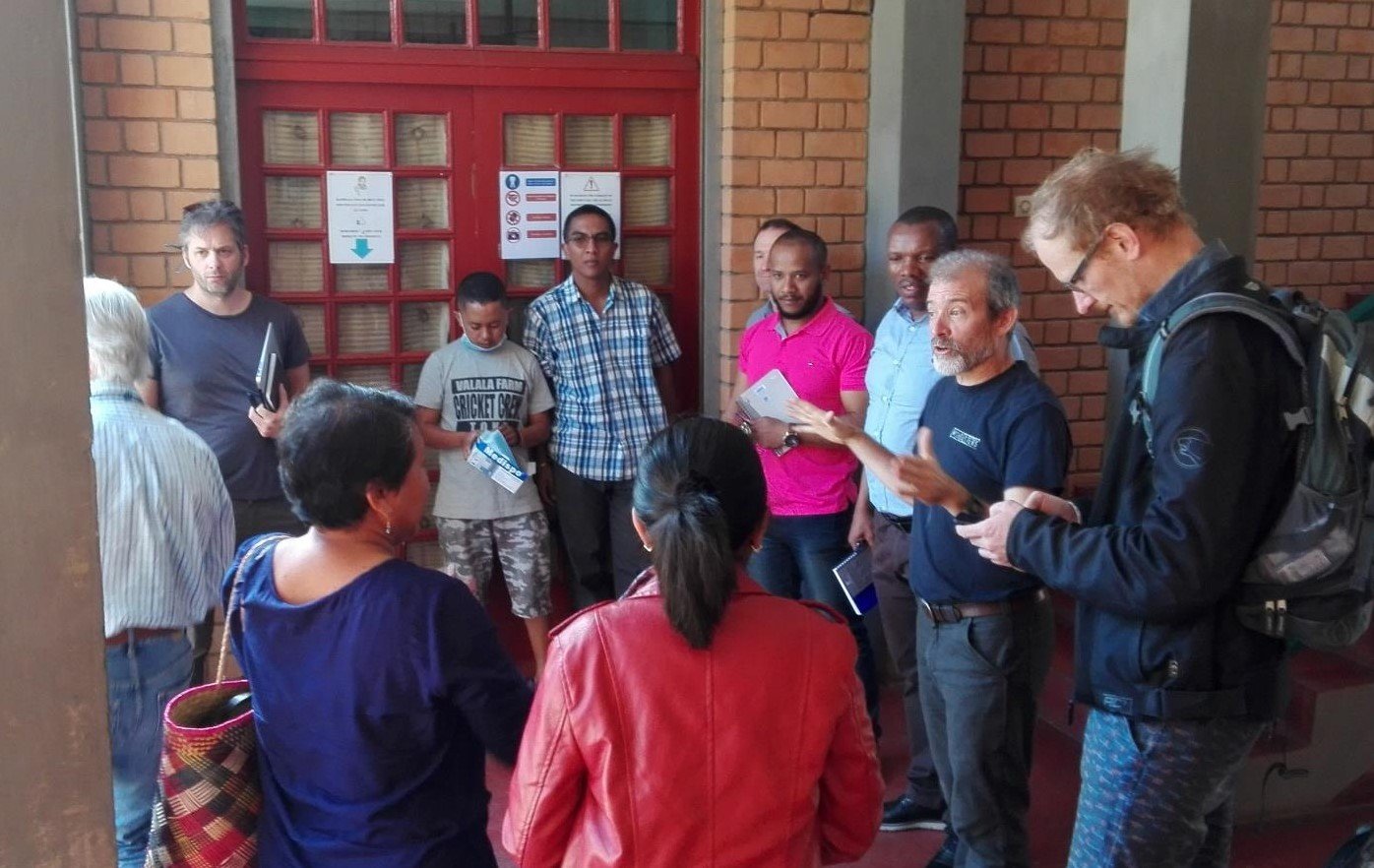 | | PEER team posing in front of MBC during USAID visit, May 2019 | Dr. Fisher, Dr. Ravelomanana and NGO representatives. Photo credit: MBC |
Back to PEER Cycle 6 Grant Recipients
|
|
|
|









